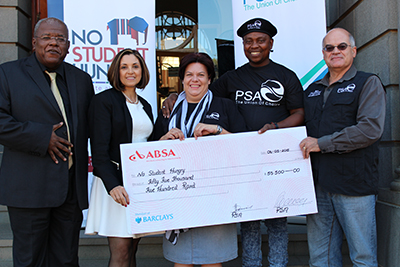Latest News Archive
Please select Category, Year, and then Month to display items
02 January 2025
|
Story Gerda-Marie van Rooyen
|
Photo Supplied
 Leading the research in South Africa is Prof Linus Franke from the Department of Soil, Crop and Climate Sciences.
Leading the research in South Africa is Prof Linus Franke from the Department of Soil, Crop and Climate Sciences.
Scientists are actively pursuing the successful breeding of diploid hybrid potatoes from inbred lines. This is expected to revolutionise potato breeding as it holds the key to rapid genetic progress. It will introduce new varieties for commercialisation through seed. Currently, existing potato variants have a gene that renders self-pollinated seeds infertile.
Prof Linus Franke, an academic in the Department of Soil, Crop and Climate Sciences at the UFS, is leading the research in South Africa. “This technology allows the production of genetically uniform potato seed that is easy to transport and largely disease-free.” He says this differs from conventional breeding whereby only vegetative propagation is possible due to tetraploid varieties in potatoes. It also risks carrying pests and diseases from one generation to the next – leading to the accumulation of pests and diseases with each round of multiplication.
Seed innovation
Prof Franke explains that Solynta BV, a seed company based in the Netherlands that produces potato varieties that can be grown from seed, has included South Africa in their research efforts because it is one of Africa’s largest producers and exporters. Through his academic relationship with Wageningen University and Research, a Dutch institution renowned for its agricultural endeavours and food production, the UFS became involved in researching hybrid potatoes grown from seed.
Diploid seeds containing two sets of chromosomes allow easier gene manipulation to increase predictability and speedier genetic progress. The breeding approach enables the incorporation of tolerance to pests, diseases, abiotic stresses (cold, heat, drought) and other desired genetic traits.
Although Prof Franke is optimistic about this research, he is not blind to disadvantages. “Potato seeds are tiny and have little energy reserves, making it harder to grow potatoes from seed than from tubers.” He says potatoes from seed will take longer to cultivate than tubers, as farmers need to grow plantlets from seeds first, adding six weeks to the growing period. “It is possible that commercial farmers can grow potatoes directly from seed. Alternatively, perhaps more likely, specialised growers will produce tubers of potatoes from seed; these tubers are then sold as seed tubers to other potato farmers, who then continue their normal practices of producing potatoes for the market from tubers.”
Financial benefits
Prof Franke says farmers have reason to get excited. “Seed potatoes will reduce input costs, as varieties with enhanced tolerance to pests and diseases require less pesticides. Planting one hectare of potatoes requires three to four tonnes of potato tubers, but only one 25 g packet of potato seeds.” Since potatoes are a more valuable commodity than maize, this technology might also increase farmers’ income potential.
No Student Hungry Programme presented with a generous donation
2015-05-18

From Left: Prof Jonathan Jansen, UFS Vice-Chancellor and Rector, Mrs Grace Jansen, Custodian of the NSH, Ms Lynsie Pelser, PSA Free State Social Responsibility Chairperson, Dr Vuyo Dyantyi, PSA President, and Mr Gerhard Koorts, PSA Provincial Manager. |
The Public Servants Association of South Africa (PSA) presented a cheque for R55 500 to the No Student Hungry Programme on 7 May 2015 at the UFS Bloemfontein Campus. The PSA has been a proud supporter of NSH, and of initiatives such as the NSH 1000/33 Stride that saw four volunteers walk from Bloemfontein to Cape Town to raise funds for the programme from the send-off on 1 May 2014 to the welcoming on 3 June 2014 in Cape Town.
On receiving the cheque, Prof Jonathan Jansen, Vice-Chancellor and Rector of the UFS, expressed his gratitude on behalf of the university and all the students who stand to benefit from this initiative.
As a politically non-affiliated union, the PSA’s main focus is labour development and community support throughout the Free State and nationally. The NSH has received a total of R165 000, donated by the union since 2014, which supports more than 25 students.
The President of the PSA, Dr Vuyo Dyantyi, said “Our motto is to invest in human potential, and in programmes that will give the future generation a chance to prosper.”
The No Student Hungry Programme supports more than 130 students each year with daily meals, mentorship, and support on all three campuses.